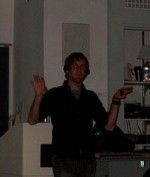Global Aids Campaign Hits Colgate

Students arriving at Monday night’s “A Portrait of the World: A Battle for the Imagination” were warned. The projection screen in the Ho Lecture Room bore a bold message: “Rated R. This presentation deals with controversial topics such as the state of the world, how to make a change, drugs and sex. An open mind is advised.”
With such provocative words, it seemed that Jay Connell, the first speaker at the Student Global AIDS Campaign’s (SGAC) AIDS Week, hoped to jolt students out of their comfort zones.
Connell, formerly a Florida college student, dropped out to travel the world and gain perspective. Stringing together his various experiences from his travels, he hoped to present an accurate portrait of the world.
Connell stressed the link between worldwide poverty and disease.
Beginning with the familiar, “It sometimes feels like there’s nothing we can do,” he assured students that we all could, even though “the world is probably impossible to completely rationalize.”
Connell used the story of a Beijing drug dealer to criticize globalization and capitalism. While studying abroad in China, he and a friend chatted with the drug dealer, and discovered his hardship-ridden life.
The man was from Ghana, where a corporation built a factory by his village.
“The trade structure they had was completely destroyed,” Connell said. “People who didn’t get jobs were subjected to severe poverty.”
This is why, Connell explained, the man traveled to China and became a drug dealer.
“I think it’s information that separates the ‘first world’ and the ‘third world,'” Connell said. This becomes extremely relevant with regards to transmission of HIV.
In countries like South Africa, AIDS is so infused into everyday consciousness that preventive measures seem almost irrelevant. The disease is so widespread, Connell said, that if you saw four children, chances are that at least one of them is infected.
This is why Connell volunteered for Sizanani, a program that educates young South African boys about HIV transmission and healthy lifestyles. The results are positive — statistics show that the boys who attended the program were much more likely to attend school (which is available but not obligatory there).
While relating firsthand accounts of oppressive poverty in nations across the globe, Connell issued a word of caution about terminology. He repeatedly referred to these places as the “Third World,” even though he realizes that “developing nation” is the politically correct term.
“There’s a problem with that. ‘Developing’ doesn’t sound urgent. Third world sounds more urgent,” he said.
This thought is in keeping with his main point. Above all, he said, we need a change in mindset. He stressed that people need to realize that world poverty and disease are pressing, urgent issues.
Many people, he said, feel overwhelmed by the world’s complex problems and therefore do nothing.
“We train ourselves to think ‘that’s just the way it is,'” he said.
However, most people will not trek to the “Third World” and get their hands dirty. Activism like the Sizanani program has profound positive impact on individual lives, but the economic sources of the problems persist. Just what the average person can do to contribute remains unclear.
Connell offered three steps to improving the world:
“1. Let your imagination run wild. 2. Do what you can. 3. Enjoy what you’re doing,” he said, calling for collective action.
“We’re inheriting a complicated world. Just picture something different. That can be a great power.”



